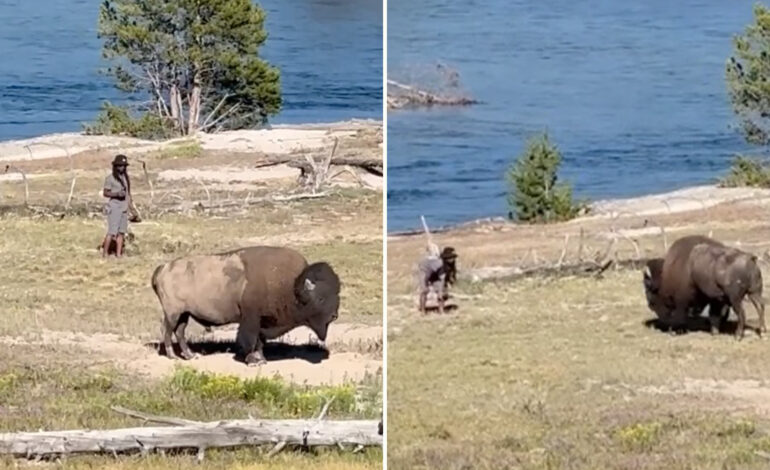Tourist Provokes Bison at Yellowstone: Shocking Video Emerges

UPDATE: A tourist at Yellowstone National Park is facing backlash after a reckless encounter with a wild bison on July 24, 2023. The shocking incident, captured on video, shows the man daringly approaching the massive animal, ignoring park safety protocols in a bid for attention.
The video depicts the unidentified man inching within mere feet of a grazing bison, a move that could have ended disastrously. Bison, despite their large size, can charge at speeds of up to 30 miles per hour, posing an extreme danger to anyone who provokes them. Witnesses remarked on the tension, with one recording the moment exclaiming, “Is he calling him out?” as the bison stalked closer.
As the bison moved menacingly toward him, the tourist hesitated and stumbled backwards, nearly tripping over a log behind him. After narrowly escaping a potentially life-threatening situation, he adopted a cocky demeanor, claiming, “It was really close, man. I think it liked me, actually,” to someone off-camera.
Park officials are urging visitors to maintain a safe distance of at least 25 feet from bison and have issued strong warnings against provoking these powerful animals. Alarmingly, this tourist attempted to taunt the bison not just once, but twice, flaunting park safety regulations for a fleeting thrill.
This reckless behavior is not an isolated incident. In 2023, two men—one from New Jersey and another from Florida—were gored by bison after approaching too closely in separate incidents. These alarming events highlight the very real dangers of ignoring park guidelines.
Adding to the tragic narrative, a bison was recently boiled to death after wandering into a hot spring, shocking onlookers who witnessed the distressing scene.
As park officials continue to reiterate the importance of respecting wildlife, this latest video serves as a stark reminder of the consequences of human folly in nature. With tourism on the rise, the need for education about safety protocols in national parks is more critical than ever.
Stay tuned for further updates on this developing story and remember: when visiting natural habitats, safety always comes first.






